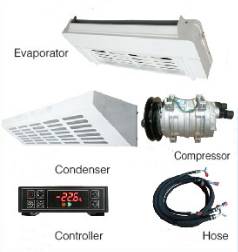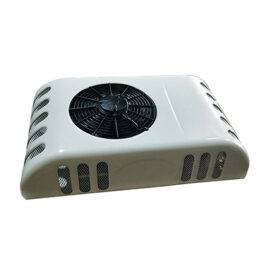Description
AC.133.070 Refrigerated Truck Units – Optimal Cargo Cooling for Every Journey
Refrigerated Truck Units AC.133.070 – Essential Temperature Control for Your Cargo
Refrigerated truck units, exemplified by the AC.133.070 from our PARKING COOLER collection, redefine the transportation of temperature-sensitive goods. This unit boasts a TM21/QP21 compressor, delivering a cooling capacity of 7000W at 0℃ and 3600W at -18℃. Operating on a 24V voltage, it ensures precise temperature control with an electronic digital display.
Key Features:
- Versatile Application: Suitable for maintaining temperatures from -18℃ to +15℃, ideal for a range of industries.
- Certified Quality: R404a refrigerant, 2.5~2.6Kg refrigerant charge, and adheres to ISO9001, TS16949, and TUV standards.
- Adaptive Box Volume: Accommodates 35m³ at -18℃ and 40m³ at 0℃, offering flexibility for various cargo sizes.
- User-Friendly Operation: Electronic digital display for easy box temperature adjustment.
Uses Across Industries:
1. Food Industry:
- Preserves freshness and quality during transportation.
- Reduces food waste by extending shelf life.
- Essential for catering and food delivery services.
2. Pharmaceutical and Medical Supply Chain:
- Safeguards temperature-sensitive drugs, vaccines, and medical supplies.
- Adheres to stringent regulatory standards to ensure product efficacy.
Key Advantages:
1. Versatility:
- Customizable to transport a variety of goods with different temperature requirements.
- From perishable food items to critical medical supplies, it’s adaptable for diverse cargo.
2. Cost-Effective:
- While the initial investment is significant, long-term savings result from reduced product spoilage and waste.
3. Reliability:
- Minimizes the risk of cargo spoilage due to consistent temperature control.
- A reliable choice for businesses prioritizing product quality.
Maintenance and Care: To ensure peak performance, regular maintenance is crucial. Routine checks on the refrigeration unit, temperature control systems, and insulation should be conducted. Promptly address any issues to prevent cargo loss.
Conclusion: Refrigerated truck units like the AC.133.070 are the silent guardians of product integrity during transit. From your favorite restaurant’s food to life-saving medicines, these vehicles play a vital role. Their precise temperature control, waste reduction, and regulatory compliance make them indispensable assets for businesses worldwide, ensuring the quality and safety of transported goods.
Elevate your cargo transportation with the AC.133.070 Refrigerated Truck Units. From perishable foods to pharmaceuticals, this unit ensures the integrity of temperature-sensitive goods. With versatile features, precise control, and reliable safety measures, it’s your trusted partner for efficient and secure cargo cooling. Invest in reliability and freshness for every journey.

https://www.acparts.cn/product-category/parking-cooler/
ACTECmax 12V/24V air conditioning unit is a premium cooling solution for semi-trucks, buses, and heavy-duty vehicles. Designed for efficient temperature control, this battery-driven AC system ensures comfort and reliability in extreme weather conditions. Its high-performance cooling technology reduces fuel consumption and extends operational efficiency.
ACTECmax 24V air conditioning unit is perfect for fleet operators, truck manufacturers, and B2B wholesale buyers looking for durable and energy-efficient climate control solutions.






